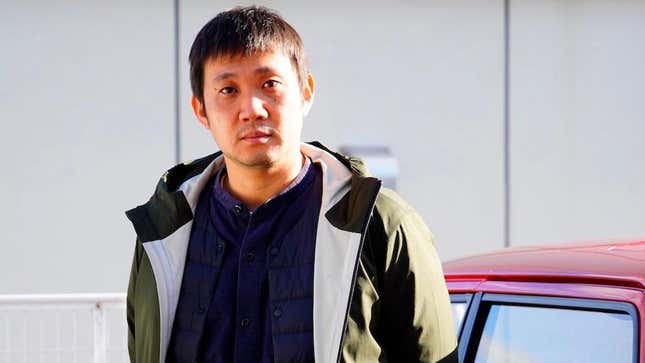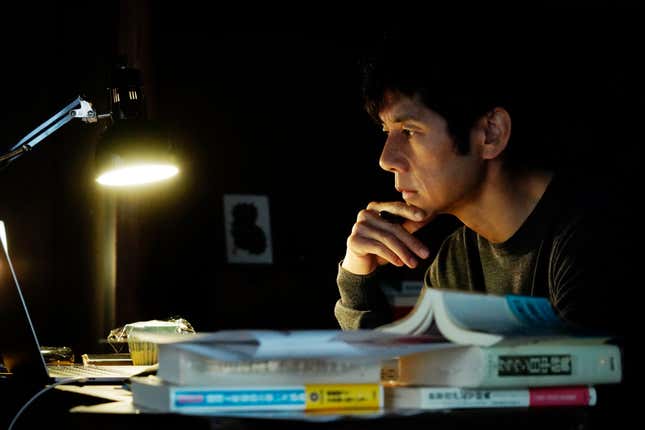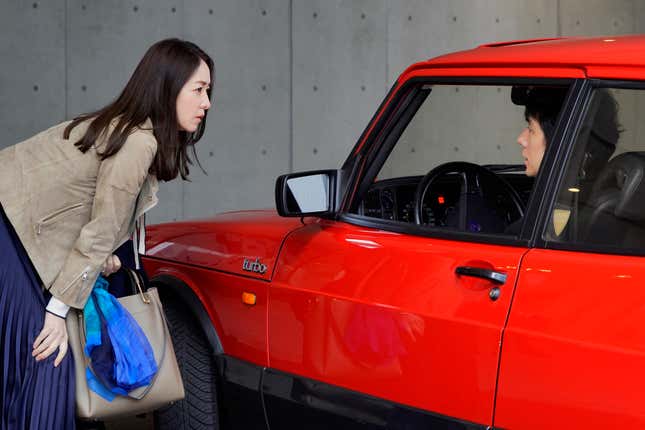
Outside of anime and horror, Japanese films can be a tough sell in the United States. Ryusuke Hamaguchi, 43, has completed nine dramatic features (and four feature documentaries) to date, and only four are commercially available here. His films have typically generated little fanfare despite their festival pedigree; the 2018 Asako I & II grossed only $25,559 during its entire U.S. theatrical run. Even after winning the Silver Bear at the Berlin International Film Festival, his 2021 film Wheel Of Fortune And Fantasy screened in only about 40 American cities.
But even though Drive My Car is an entire hour longer than either of those titles, it has collected three major prizes at the Cannes Film Festival and four Oscar nominations including Best Picture, emerging as one of the year’s most acclaimed and successful foreign films. Hamaguchi recently spoke to The A.V. Club about several topics, including the film’s wild ride from a production halted by the pandemic all the way to the Academy Awards.
The A.V. Club: Many of your characters seem to act on impulse, but based on your filmmaking style, you don’t seem to be an impulsive person. Can you talk a little bit about your thoughts on impulsivity and why it is such rich fodder for your films?
Ryusuke Hamaguchi: I think impulsivity is good. And impulsivity is something that I’m always looking for, but only when that impulsivity comes from somewhere that’s very honest. Impulsivity that’s performed is the kind of thing that I least want to see in a film. And so what I’m really asking for is a precise impulsiveness. And I don’t know if that necessarily makes sense, but it’s something that I tell myself, too. I look for myself to be impulsive in an honest manner. But I think it’s important to be able to concentrate very hard, to actually be able to perceive whether that impulsivity was in fact real. And you have to concentrate in order to be able to figure that out. And so who knows? I might one day suddenly impulsively decide to disappear, but who knows?
AVC: Your movies are often about coincidences and chance encounters. Do you allow for and embrace such happenstances when you are making a film? Or do you prefer to stick to the script?
RH: I think there’s two sides to what we’re talking about here, because fundamentally speaking, I think coincidence is incredibly important in making and shooting a film. Because if you can capture these things that are coincidences, I think there is an ability to make it seem like this is something that was captured and could have only been captured only once, it only happened this one time. And so in that sense, I think coincidence is important when we’re thinking about recording this kind of reality. The other part of this is that, this is similar to our conversation about impulse earlier, but it doesn’t mean that any coincidence is okay. I think when a story is being told, I think what coincidence has to do is it has to go through certain planning. It has to come through certain planning, but there needs to be room for coincidences to happen.
So the way that I allow for this really is to do these readings. Because by having the actors do readings many times over without incorporating emotion in it, we get to a place where the dialogue comes out of the actors almost automatically. It’s not something that’s conscious, it just really comes out automatically. What is actually being said is quite planned, but how it’s going to be said is not planned. And I think that’s where the room for coincidences occur. The impulses behind these words are not planned, so there’s room for coincidences. And in my filmmaking, I want to increase my skills to make more room for these coincidences to happen.
AVC: You seem to be fascinated by doppelgängers.
RH: I’m not sure whether I am in fact fascinated by doppelgängers, but there has been a case where on Twitter, somebody said they saw me, but it was some somewhere that I had never been to. So it made me think, perhaps there’s a doppelgänger of me out there. But I don’t think I’m so interested in doppelgängers, at least not as interested as perhaps my mentor Kiyoshi Kurosawa might be. But perhaps you’re asking me this because of Asako I & II, and perhaps Wheel Of Fortune And Fantasy, and having doppelgänger elements in the stories.
But I think what I’m most interested about doppelgängers and the idea of doppelgängers is just the impossibility of it, how impossible it can seem, and how absurd it is. And I think the original story of Asako I & II, I think, managed to make this in possibility feel very convincing, so I decided to adapt this. But I think their absurdity is something that is actually important in film, and actually maybe rather in fiction. Because there’s very much a one-to-one logic to things in reality. I think humans have a limit of understanding. But fiction I think has the ability to show absurdity, to show these things. And I think that showing the absurdities helps us get ready for absurdities in our own lives. So perhaps I’m just getting ready to meet my own doppelgänger for these absurdities to happen in my own life as well.

AVC: The 2011 Tohoku earthquake played a prominent part in Asako I & II just as a 2018 landslide had a role in Drive My Car. What is the significance of these natural disasters to your stories?
RH: So this is going to sound a little bit like I’m making an excuse, but the Great East Japan Earthquake that appears in Asako I & II, it was actually written into the screenplay by my cowriter, Sachiko Tanaka. So in the original story, Asako I & II, behind the protagonist, in the background, there were always things that were showing about what was going on in Japan at the time, and that was through perhaps TV screens, and those were the ways that they were shown.
The original story of Asako I & II spans the time from the late ’90s into 2008, and that’s the span of the original story. But I knew I wanted to make a contemporary story, but I also knew that the span of time that the story will take is about a decade. So I knew that probably it would include the earthquake in the story. And I had talked about this with Sachiko Tanaka when she went about writing the first draft of the story. In my mind, I was expecting them to pop up in TV and in minor ways in the story, but what Sachiko brought back showed the earthquake and depicted it in much bigger ways in the story. And she said to me, “I realize that this is a very sensitive topic to handle,” but she said, “You have shot these documentaries in the Tohoku region.” And so she presented to me that, “Perhaps you are the person who should be dealing with this kind of topic in your film.”
So ultimately, the film became a kind of film where the structure really very much relied on the earthquake. And to some extent, it was me being unable to suggest an alternative to this. So I decided, “Okay, I’m just going to go with it,” and really decided to shoot the film in this way. Regarding the landslide in Drive My Car, it’s actually not based on a real landslide. It’s actually a landslide that I brought into the story. It’s a fictitious landslide. But I think ultimately speaking, all these things are almost coincidental that these appear in the film. It wasn’t necessarily something I was very conscious of, but to me, it almost feels like these moments that I just really had to pass through, it’s like a rite of passage in a way that I really had to do.
Which reminds me of my own experiences of the earthquake itself, because I don’t think I could have written all of these things consciously. And people ask me often about the element of Hiroshima in Drive My Car, and how I was thinking about that. But the thing is we sort of almost coincidentally ended up shooting in Hiroshima. And so all of these things coming into my stories almost… I’ve taken it into stride as thinking that it’s almost like fate, or something that I just must do.
AVC: What was it like directing a multinational cast? What are some of the biggest challenges and rewards? Did directing Drive My Car change your views in any way?
RH: What I really learned is that one must really prepare properly before embarking on something like this. So we started shooting the film before the pandemic, around March 2020, but we got through 10 days of the shoot of the film, and then we had to stop because of the Coronavirus pandemic. And we were supposed to originally go straight to Korea and shoot the rest of the scenes, and to do the multi-language theater play there. But now that I look back on my experience of having shot that, I don’t think it would’ve been possible to follow that schedule, because I realized in doing this scene, just how difficult it was going to be to do this multi-language shoot.
So because of the pandemic, we ended up having an eight-month break in our shoot, and that allowed for time for preparation. It also allowed for time for the actor Park Yu-Rim to be able to also practice Korean sign language, to train for Korean sign language, because she originally didn’t use Korean sign language to begin with. So that time was really necessary. Now that I think about it, if we had really gone according to the original schedule, I don’t think we would’ve been able to shoot what we did end up shooting. And I’ve been talking about this with my producer, of just how lucky we were for the production to be able to have this time. And we have also said next time we embark on something so difficult and so strenuous, we definitely have to do things differently. We can’t just go ahead and think that we can go and shoot this, but that we really need to take the time to prepare for something like this.
AVC: Let’s clear up the ending of Drive My Car. Masaki moved to South Korea, bought her own Saab 900 Turbo, and adopted her own dog. I talked to someone who didn’t realize she moved, and they thought Kafuku gave her the car, and the Korean couple gave her their dog.
RH: So let me just talk about what is actually within the film, which is that she is in Korea in that scene, so she is probably there. She is there. She is also in a Saab. But in regards to whether that Saab was from Kafuku, whether she bought it herself, that we don’t know. But if you look at the film perhaps twice and see carefully, you can actually see that the dogs are actually different breeds from each other, so they’re different. So with those facts in mind, I just want everybody to think for themselves, interpret for themselves as to what that all means and what’s actually going on. What I do want people to take away with from the end is that Misaki met Kafuku, she also watched that theater piece at the end, the performance at the end. And at the end of, when we see Misaki, she has an expression that we haven’t seen before on her face. There’s a new expression. And I think, if the audience can receive whatever they can from that expression and leave the theater with that, that’s all that really matters to me.
AVC: Are you surprised by the success of Drive My Car? Do you wish Wheel Of Fortune And Fantasy had garnered the same amount of attention?
RH: Regarding the success of Drive My Car, I was very surprised, to be quite honest. When I was on set making the film, I had the sense that I was capturing something wonderful and something brilliant, and I felt that there will be something that can reach to somebody at a personal level, but I didn’t think that there would be so many of those somebodies, that there would be so many individuals who can get something out of the film and that people have. And I’m very surprised by that. Regarding Wheel Of Fortune And Fantasy, I wouldn’t say that I don’t think that I wish more people were seeing the film necessarily. I wouldn’t say flat out no, but when I compare it to the scale that my past films have traveled, I think it’s quite comparable, and I think in fact, it’s reaching more people than the past works have. And I think it’s also due in fact, because of Drive My Car, that people are also compelled to watch Wheel Of Fortune And Fantasy.

But at the end of the day, I don’t think that films necessarily have to be seen immediately after they’re made. I think perhaps in watching some of my films, if people can go, “Oh, I wonder what he’s made in the past,” and go back to watch some of my past films, I think that’s great. I don’t think films just have to be seen right now. And in some ways, I see this film as long-distance running.
AVC: What are some of the most unexpected kinds of feedback that you have received on your films?
RH: The fact that [Drive My Car] made it on Obama’s film list. It really felt like it just suddenly appeared out of a blind spot of mine.